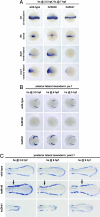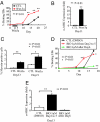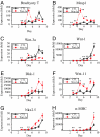Biphasic role for Wnt/beta-catenin signaling in cardiac specification in zebrafish and embryonic stem cells
- PMID: 17522258
- PMCID: PMC1876428
- DOI: 10.1073/pnas.0702859104
Biphasic role for Wnt/beta-catenin signaling in cardiac specification in zebrafish and embryonic stem cells
Abstract
Understanding pathways controlling cardiac development may offer insights that are useful for stem cell-based cardiac repair. Developmental studies indicate that the Wnt/beta-catenin pathway negatively regulates cardiac differentiation, whereas studies with pluripotent embryonal carcinoma cells suggest that this pathway promotes cardiogenesis. This apparent contradiction led us to hypothesize that Wnt/beta-catenin signaling acts biphasically, either promoting or inhibiting cardiogenesis depending on timing. We used inducible promoters to activate or repress Wnt/beta-catenin signaling in zebrafish embryos at different times of development. We found that Wnt/beta-catenin signaling before gastrulation promotes cardiac differentiation, whereas signaling during gastrulation inhibits heart formation. Early treatment of differentiating mouse embryonic stem (ES) cells with Wnt-3A stimulates mesoderm induction, activates a feedback loop that subsequently represses the Wnt pathway, and increases cardiac differentiation. Conversely, late activation of beta-catenin signaling reduces cardiac differentiation in ES cells. Finally, constitutive overexpression of the beta-catenin-independent ligand Wnt-11 increases cardiogenesis in differentiating mouse ES cells. Thus, Wnt/beta-catenin signaling promotes cardiac differentiation at early developmental stages and inhibits it later. Control of this pathway may promote derivation of cardiomyocytes for basic research and cell therapy applications.
Conflict of interest statement
The authors declare no conflict of interest.
Figures





Comment in
-
Early cardiac development: a Wnt beat away.Proc Natl Acad Sci U S A. 2007 Jun 5;104(23):9549-50. doi: 10.1073/pnas.0703731104. Epub 2007 May 30. Proc Natl Acad Sci U S A. 2007. PMID: 17537915 Free PMC article. No abstract available.
References
Publication types
MeSH terms
Substances
Grants and funding
- R01 HL084642/HL/NHLBI NIH HHS/United States
- GM69983/GM/NIGMS NIH HHS/United States
- R01 HL064387/HL/NHLBI NIH HHS/United States
- P20 GM069983/GM/NIGMS NIH HHS/United States
- P01 HL003174/HL/NHLBI NIH HHS/United States
- R24 HL064387/HL/NHLBI NIH HHS/United States
- HL03174/HL/NHLBI NIH HHS/United States
- HL64387/HL/NHLBI NIH HHS/United States
- R01 HL061553/HL/NHLBI NIH HHS/United States
- GM073887/GM/NIGMS NIH HHS/United States
- HL61553/HL/NHLBI NIH HHS/United States
- R01 GM073887/GM/NIGMS NIH HHS/United States
- HL84642/HL/NHLBI NIH HHS/United States
LinkOut - more resources
Full Text Sources
Other Literature Sources
Molecular Biology Databases

